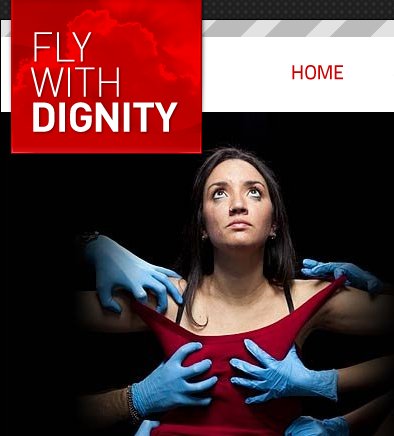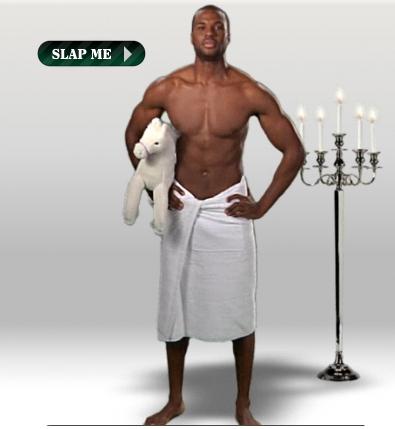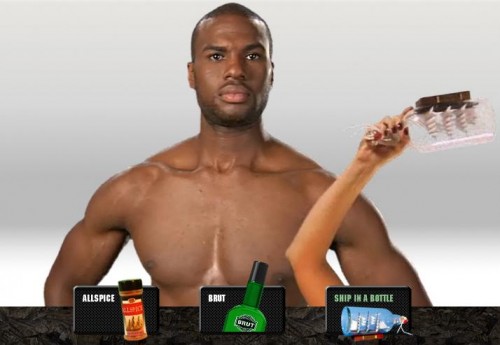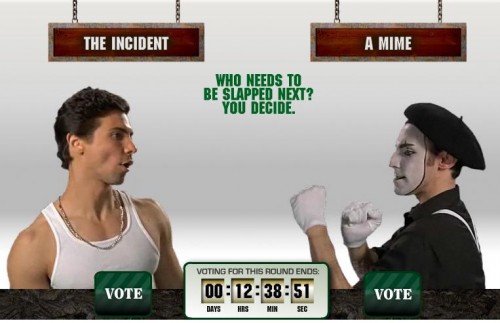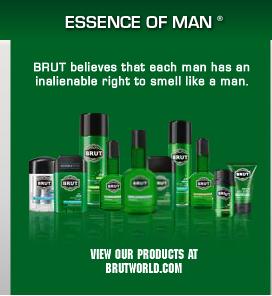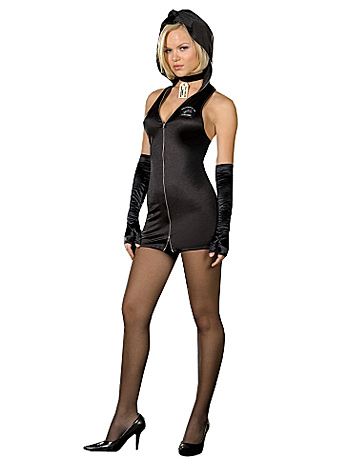An anonymous frequent reader sent in this Calvin Klein jeans ad that has been removed from billboards in Australia after the Advertising Standards Bureau banned its display on the grounds that it implies sexual assault. I’m putting it after the jump because it might be triggering for some people.
gender: violence
Concerns about the use of full-body scanners at airports have been in the news repeatedly in the last week or so, though polls show high levels of support or at least tolerance for them among the American public. The major issue appears to be concerns about privacy, since the scanners provide an image of a person’s body through their clothing, which can be quite detailed, though others also mentioned health concerns and whether or not the scanners actually increase safety.
Amanda C. pointed out that the organization Fly with Dignity, which opposes the use of scans, has three rotating images on their website homepage, two of which clearly connect the scanning process with the idea of women being groped, complete with their tear-stained, distraught faces as they go through a pat-down (the alternative to a scan):
Apparently when trying to make a point about being degraded or victimized, men don’t make suitable subjects.
Amanda finds it disturbing that they’re equating pat-downs (your option if you refuse a full-body scan) with sexualized violence (and using images of traumatized women to do so).
Gizmodo has released a gallery of leaked images from body scans, if you’d like to see some examples (here’s a fuller story about the images—thanks to Alll for the tip.)
Thoughts? Is sexual molestation a legitimate metaphor here?
Cross-posted at Jezebel.
Since Lisa posted about the Old Spice guy today, I thought I’d post about a reaction to it. Stephanie V. let us know about Brut’s new feature on their website, Some Men Just Need to be Slapped. The…game (?) presents Man in a Towel, clearly meant as a parody of the Old Spice character:
You are then invited to slap him with various items:
In each case the hand shown slapping him is a woman’s, though for some reason when you click the option to slap him with Brut, it’s just an empty hand, not the actual bottle. Presumably her palm has Brut on it.
You can also then choose who should be the next slapping option — a character called The Incident (a parody of The Situation from Jersey Shore) or a mime:
Brut is going with the theme common in men’s hygiene products, which is to reinforce a certain stereotypical type of masculinity. Their website refers to Brut as “essence of man”:
As Stephanie says, “I didn’t even know they still made Brut — but clearly they’re trying to hone in on the Old Spice crowd by challenging their manhood.” And how better to denigrate a guy as insufficiently masculine? Show him being slapped by a woman, of course.

Cross-posted at Ms.
Happy A. sent in an article at comment dit-on about a new anti-domestic violence ad in Chile that tells men not to hit women by using openly homophobic language — specifically saying that a man who hits a woman is a “maricón,” the equivalent of “faggot”:
Translation of the main text: “A faggot is one who hurts a woman.”
It’s a blatant example of the way leftist groups often undermine each other, fighting one form of inequality or discrimination by reinforcing another (see: everything PETA ever did). The group that put out the PSA added that a man who hits a woman is “poco hombre,” or barely a man, reinforcing the idea that gay men are insufficiently masculine. As the comment dit-on post author says, “Clearly, a larger conversation needs to take place about what it means to be powerful and attitudes that marginalize the powerless.”
UPDATE: Reader chinamorena says, “adding an interesting layer is the fact that the second man who speaks in the ad is Jordi Castell, a publicly gay tv personality.”
JT sent along the following submission for grossest Halloween costume: the Jane Doe DOA. That’s Jane Doe Dead on Arrival to you. And isn’t she hot in her custom-made body bag and “choker”?
The description:
Although she doesn’t have much of a personality, she is still drop dead gorgeous in this body bag dress, I’m sure you have the personality and in this you will be gorgeous. Stretch satin mini dress with hood and a two way zipper front which can zip all the way up the hood, this is sleeveless and has a vest style finish at the back. One breast has an outline of a body printed on to it an PROPERTY OF THE CORONER. Pack includes Coroners name tag fitted to a choker Jane Doe and matching fingerless gloves. (3 piece set). Fabrics are listed as 95% polyester and 5% spandex. and other accessories are available separately.
Lisa Wade, PhD is an Associate Professor at Tulane University. She is the author of American Hookup, a book about college sexual culture; a textbook about gender; and a forthcoming introductory text: Terrible Magnificent Sociology. You can follow her on Twitter and Instagram.
A former CEO of World Wrestling Entertainment, Linda McMahon (R) is running in Connecticut for a seat in the U.S. Senate. In an essay at the Huffington Post, sent in by Dr. Caroline Heldman, Jackson Katz explains that her company has promoted “…some of the most brutal, violent and hateful depictions of women in all of media culture over the past twenty years.” The violence and misogyny in professional wrestling is an issue that Katz has taken on personally in his documentary, Wrestling with Manhood.
Media actors, he argued, have not focused on the substance of her company’s product, so much as its amazing success. Katz, however, challenges the idea that her business acumen is more important than the fact that she spent 20 years promoting and excusing violence against women:
…incredibly, the rampant misogyny of McMahon’s WWE has gotten scant coverage during this fall’s U.S. senate campaign in Connecticut. Political reporters have largely rolled over and bought the McMahon campaign line that what goes on in professional wrestling is only entertainment, that the WWE has gotten more family-friendly in recent years, and that we should all just lighten up and focus on what really matters about Linda McMahon’s stewardship of the WWE: her savvy business skills and experience.
Hoping to bring attention to the kind of messages the WWE sent under McMahon’s leadership, Katz put together this 11-minute clip from his documentary (trigger warning):
Lisa Wade, PhD is an Associate Professor at Tulane University. She is the author of American Hookup, a book about college sexual culture; a textbook about gender; and a forthcoming introductory text: Terrible Magnificent Sociology. You can follow her on Twitter and Instagram.

Alex C. sent in an example of the belittling of men by men in the context of sport. Two teenager fans of the Red Sox found themselves verbally assaulted by Yankee fans for the sin of sitting amongst them. They surround the boys and sing, aggressively, to the tune of YMCA, after a mostly indecipherable lead in:
Why are you gay!
I saw you suckin’ it, D-I-C-K.
They have every size, you’re about to enjoy.
You can hang out with all the boys!
Why are you gay!
I saw you suckin’ some D-I-C-K.
It should be clear to everyone that this behavior represents a sick society. Team affiliation follows the rules of the minimal group paradigm: humans appear to be willing to form meaningful groups based on just about anything. Sports just happens to be an arena in which hypermasculinity is rewarded, even demanded. This makes it acceptable to be cruel to one another and makes it inevitable that that cruelty will take the form of hatred towards gay men (deemed masculine failures) in the form of homophobic slurs. It’s not even that they think the kids are gay, but calling them gay is good for a laugh and a great insult.
This is what it’s like to be a man under patriarchy: moments of inhumanity in which men accept and reproduce hatred against others and moments of victimization when other men aim that hatred at you.
Lisa Wade, PhD is an Associate Professor at Tulane University. She is the author of American Hookup, a book about college sexual culture; a textbook about gender; and a forthcoming introductory text: Terrible Magnificent Sociology. You can follow her on Twitter and Instagram.
Please welcome Guest Blogger Ashley Mears. Mears is a model-turned-sociologist who is doing fantastic work on the modeling industry. In her forthcoming book, Pricing Beauty: Value in the Fashion Modeling World (UC Berkeley Press), she examines the production of value in fashion modeling markets. When Osocio‘s Tom Megginson forwarded us a link to a trailer for a new documentary on the topic, Picture Me, we turned immediately to our resident expert. We’re so pleased that she agreed to share her thoughts.
———————————

Picture Me documents ex-model Sara Ziff’s 4-year rise and exit through the fashion modeling industry. It sets out to expose the grit behind the glamour, chronicling models’ exhausting work and travel schedules, warped body images (include hints of anorexic and bulimic practices), debt to agencies, innocent youth and the attendant vulnerability to sexual predatory clients. It is a long, wandering complaint of the industry, and in the end, Ziff equates all bodywork with exploitation and dismisses modelling work as cheap thrills—albeit emotionally costly ones.
While critical of the industry, the film glamorizes what it supposedly condemns, most insidiously by portraying Ziff’s meteoric success as normal for a model. Twice the camera zooms in on the many digits of her paychecks. As her co-filmmaker/boyfriend Ole Schell wryly notes, “It’s not everyday you see a check for $112,000.” This is especially the case, they should add, for most working fashion models. As a winner-take-all market, modelling is extremely unequal; very few women reach this kind of success. At any given modelling agency, in fact, dozens of women owe significant debt, an issue far more complex—and exploitive—than the moments it gets in Picture Me. Models accrue debt for start-up costs advanced by their agencies, from plane tickets and visas to pocket money and apartment rent in an agency-owned apartment (to the tune of about $250 per week to stay regardless of how full or vacant its state). They are charged anywhere from $5 to $50 for bike messengers to deliver their portfolios across town daily. These costs are not negotiable or traceable; they are deducted automatically from her future earnings. And they add up; at one New York agency I studied, a model was in the hole up to $18,000 even before stepping foot into her first casting audition. To recoup their losses, agencies count on the top 5% of their models who bill more than $100,000 annually, people like Ziff who are statistical anomalies in their field.
A model who leaves an agency with a debt is legally bound by contract to repay it, though accountants will tell you that they don’t bother to pursue these debts, since indebted models are an unlikely source from whom to recoup losses. Instead, agencies write off negative accounts as business expenses. However, models’ negative accounts will by law transfer to their next agencies should they attempt to work elsewhere, which is unlikely as agencies are hesitant to represent models with existing negative balances from prior agencies. In other words, once in debt, everywhere in debt. It is an independent contractor status designed to alleviate the organization’s responsibility for its worker, pushing all market risks onto the freelancer in a work relationship that can resemble indentured servitude. Thus, Ziff sits at the top of the pile, nonchalantly waving a wad of cash in her hand that masks a precarious career structure in which, for every Sara Ziff, there are thousands of women struggling to make ends meet.
———————————
Another telling omission in the film is men. Ziff’s accusations of systemic sexual abuse are distressing, and something I heard all too commonly in interviews with models—male models, that is. I found women were far less likely than men to recount ordeals of sexual advances by clients. There are a couple of explanations for this discrepancy. First, it is likely that female models may not report or even recognize as report-worthy sexual advances by men, given the ubiquity of sexual harassment women are likely to face on any job. Second, the filmmakers seem to have encouraged their subjects to recount their ordeals in confessional-style video diaries, a technique quite different from open-ended interviewing.
Also likely, I think male models do experience more unwanted come-ons than female models. In an industry over-represented with gay men in decision-making positions, male models report feeling pressure to flirt with men in order to book jobs. Male models earn considerably less than their female peers, making each job more important to them, and their agents often instruct them to charm important clients. It’s referred to jokingly in the industry as going “gay for pay,” similar to male porn actors who do gay sex scenes to boost their earnings. Male models do not as a population identify as gay, but it’s widespread and openly acknowledged that straight men must flirt shamelessly with gay clients to get work. As one male model told me, “Everyone has to play his cards.”
But it’s not a game to the men I interviewed who told horror stories of such performances turning into threatening situations. Men reported being “felt up” by stylists while dressing, told to wear revealing clothes, or no clothes at all, and being kissed and hugged by prestigious clients at parties. One model described how, on a shoot with a male photographer, he was asked to make himself semi-erect. This is not to downplay women’s encounters with sexual harassment in the industry, but to note that all models are relatively powerless in this market, and given the sex composition of those in power, male models are especially vulnerable.
Picture Me revolves around shocking personal narratives, and as a biting (and I think unfair) NY Times review notes, the filmmakers go straight for the easy critiques at the expense of their social context. It’s hard to contextualize economics, gender and sexuality, and a complicated career structure in a 75-minute documentary, especially when stomach-turning confessionals and eye-catching runway pictures are so readily available. And this is what sociologists are for anyway.
For more of Mear’s insights on the modeling industry, see our posts on the contrasting aesthetics of high end and commercial modeling, the ugly other side of the model search, and control and thinness.
Lisa Wade, PhD is an Associate Professor at Tulane University. She is the author of American Hookup, a book about college sexual culture; a textbook about gender; and a forthcoming introductory text: Terrible Magnificent Sociology. You can follow her on Twitter and Instagram.
Concerns about the use of full-body scanners at airports have been in the news repeatedly in the last week or so, though polls show high levels of support or at least tolerance for them among the American public. The major issue appears to be concerns about privacy, since the scanners provide an image of a person’s body through their clothing, which can be quite detailed, though others also mentioned health concerns and whether or not the scanners actually increase safety.
Amanda C. pointed out that the organization Fly with Dignity, which opposes the use of scans, has three rotating images on their website homepage, two of which clearly connect the scanning process with the idea of women being groped, complete with their tear-stained, distraught faces as they go through a pat-down (the alternative to a scan):
Apparently when trying to make a point about being degraded or victimized, men don’t make suitable subjects.
Amanda finds it disturbing that they’re equating pat-downs (your option if you refuse a full-body scan) with sexualized violence (and using images of traumatized women to do so).
Gizmodo has released a gallery of leaked images from body scans, if you’d like to see some examples (here’s a fuller story about the images—thanks to Alll for the tip.)
Thoughts? Is sexual molestation a legitimate metaphor here?
Cross-posted at Jezebel.
Since Lisa posted about the Old Spice guy today, I thought I’d post about a reaction to it. Stephanie V. let us know about Brut’s new feature on their website, Some Men Just Need to be Slapped. The…game (?) presents Man in a Towel, clearly meant as a parody of the Old Spice character:
You are then invited to slap him with various items:
In each case the hand shown slapping him is a woman’s, though for some reason when you click the option to slap him with Brut, it’s just an empty hand, not the actual bottle. Presumably her palm has Brut on it.
You can also then choose who should be the next slapping option — a character called The Incident (a parody of The Situation from Jersey Shore) or a mime:
Brut is going with the theme common in men’s hygiene products, which is to reinforce a certain stereotypical type of masculinity. Their website refers to Brut as “essence of man”:
As Stephanie says, “I didn’t even know they still made Brut — but clearly they’re trying to hone in on the Old Spice crowd by challenging their manhood.” And how better to denigrate a guy as insufficiently masculine? Show him being slapped by a woman, of course.

Cross-posted at Ms.
Happy A. sent in an article at comment dit-on about a new anti-domestic violence ad in Chile that tells men not to hit women by using openly homophobic language — specifically saying that a man who hits a woman is a “maricón,” the equivalent of “faggot”:
Translation of the main text: “A faggot is one who hurts a woman.”
It’s a blatant example of the way leftist groups often undermine each other, fighting one form of inequality or discrimination by reinforcing another (see: everything PETA ever did). The group that put out the PSA added that a man who hits a woman is “poco hombre,” or barely a man, reinforcing the idea that gay men are insufficiently masculine. As the comment dit-on post author says, “Clearly, a larger conversation needs to take place about what it means to be powerful and attitudes that marginalize the powerless.”
UPDATE: Reader chinamorena says, “adding an interesting layer is the fact that the second man who speaks in the ad is Jordi Castell, a publicly gay tv personality.”
JT sent along the following submission for grossest Halloween costume: the Jane Doe DOA. That’s Jane Doe Dead on Arrival to you. And isn’t she hot in her custom-made body bag and “choker”?
The description:
Although she doesn’t have much of a personality, she is still drop dead gorgeous in this body bag dress, I’m sure you have the personality and in this you will be gorgeous. Stretch satin mini dress with hood and a two way zipper front which can zip all the way up the hood, this is sleeveless and has a vest style finish at the back. One breast has an outline of a body printed on to it an PROPERTY OF THE CORONER. Pack includes Coroners name tag fitted to a choker Jane Doe and matching fingerless gloves. (3 piece set). Fabrics are listed as 95% polyester and 5% spandex. and other accessories are available separately.
Lisa Wade, PhD is an Associate Professor at Tulane University. She is the author of American Hookup, a book about college sexual culture; a textbook about gender; and a forthcoming introductory text: Terrible Magnificent Sociology. You can follow her on Twitter and Instagram.
A former CEO of World Wrestling Entertainment, Linda McMahon (R) is running in Connecticut for a seat in the U.S. Senate. In an essay at the Huffington Post, sent in by Dr. Caroline Heldman, Jackson Katz explains that her company has promoted “…some of the most brutal, violent and hateful depictions of women in all of media culture over the past twenty years.” The violence and misogyny in professional wrestling is an issue that Katz has taken on personally in his documentary, Wrestling with Manhood.
Media actors, he argued, have not focused on the substance of her company’s product, so much as its amazing success. Katz, however, challenges the idea that her business acumen is more important than the fact that she spent 20 years promoting and excusing violence against women:
…incredibly, the rampant misogyny of McMahon’s WWE has gotten scant coverage during this fall’s U.S. senate campaign in Connecticut. Political reporters have largely rolled over and bought the McMahon campaign line that what goes on in professional wrestling is only entertainment, that the WWE has gotten more family-friendly in recent years, and that we should all just lighten up and focus on what really matters about Linda McMahon’s stewardship of the WWE: her savvy business skills and experience.
Hoping to bring attention to the kind of messages the WWE sent under McMahon’s leadership, Katz put together this 11-minute clip from his documentary (trigger warning):
Lisa Wade, PhD is an Associate Professor at Tulane University. She is the author of American Hookup, a book about college sexual culture; a textbook about gender; and a forthcoming introductory text: Terrible Magnificent Sociology. You can follow her on Twitter and Instagram.

Alex C. sent in an example of the belittling of men by men in the context of sport. Two teenager fans of the Red Sox found themselves verbally assaulted by Yankee fans for the sin of sitting amongst them. They surround the boys and sing, aggressively, to the tune of YMCA, after a mostly indecipherable lead in:
Why are you gay!
I saw you suckin’ it, D-I-C-K.
They have every size, you’re about to enjoy.
You can hang out with all the boys!
Why are you gay!
I saw you suckin’ some D-I-C-K.
It should be clear to everyone that this behavior represents a sick society. Team affiliation follows the rules of the minimal group paradigm: humans appear to be willing to form meaningful groups based on just about anything. Sports just happens to be an arena in which hypermasculinity is rewarded, even demanded. This makes it acceptable to be cruel to one another and makes it inevitable that that cruelty will take the form of hatred towards gay men (deemed masculine failures) in the form of homophobic slurs. It’s not even that they think the kids are gay, but calling them gay is good for a laugh and a great insult.
This is what it’s like to be a man under patriarchy: moments of inhumanity in which men accept and reproduce hatred against others and moments of victimization when other men aim that hatred at you.
Lisa Wade, PhD is an Associate Professor at Tulane University. She is the author of American Hookup, a book about college sexual culture; a textbook about gender; and a forthcoming introductory text: Terrible Magnificent Sociology. You can follow her on Twitter and Instagram.
Please welcome Guest Blogger Ashley Mears. Mears is a model-turned-sociologist who is doing fantastic work on the modeling industry. In her forthcoming book, Pricing Beauty: Value in the Fashion Modeling World (UC Berkeley Press), she examines the production of value in fashion modeling markets. When Osocio‘s Tom Megginson forwarded us a link to a trailer for a new documentary on the topic, Picture Me, we turned immediately to our resident expert. We’re so pleased that she agreed to share her thoughts.
———————————

Picture Me documents ex-model Sara Ziff’s 4-year rise and exit through the fashion modeling industry. It sets out to expose the grit behind the glamour, chronicling models’ exhausting work and travel schedules, warped body images (include hints of anorexic and bulimic practices), debt to agencies, innocent youth and the attendant vulnerability to sexual predatory clients. It is a long, wandering complaint of the industry, and in the end, Ziff equates all bodywork with exploitation and dismisses modelling work as cheap thrills—albeit emotionally costly ones.
While critical of the industry, the film glamorizes what it supposedly condemns, most insidiously by portraying Ziff’s meteoric success as normal for a model. Twice the camera zooms in on the many digits of her paychecks. As her co-filmmaker/boyfriend Ole Schell wryly notes, “It’s not everyday you see a check for $112,000.” This is especially the case, they should add, for most working fashion models. As a winner-take-all market, modelling is extremely unequal; very few women reach this kind of success. At any given modelling agency, in fact, dozens of women owe significant debt, an issue far more complex—and exploitive—than the moments it gets in Picture Me. Models accrue debt for start-up costs advanced by their agencies, from plane tickets and visas to pocket money and apartment rent in an agency-owned apartment (to the tune of about $250 per week to stay regardless of how full or vacant its state). They are charged anywhere from $5 to $50 for bike messengers to deliver their portfolios across town daily. These costs are not negotiable or traceable; they are deducted automatically from her future earnings. And they add up; at one New York agency I studied, a model was in the hole up to $18,000 even before stepping foot into her first casting audition. To recoup their losses, agencies count on the top 5% of their models who bill more than $100,000 annually, people like Ziff who are statistical anomalies in their field.
A model who leaves an agency with a debt is legally bound by contract to repay it, though accountants will tell you that they don’t bother to pursue these debts, since indebted models are an unlikely source from whom to recoup losses. Instead, agencies write off negative accounts as business expenses. However, models’ negative accounts will by law transfer to their next agencies should they attempt to work elsewhere, which is unlikely as agencies are hesitant to represent models with existing negative balances from prior agencies. In other words, once in debt, everywhere in debt. It is an independent contractor status designed to alleviate the organization’s responsibility for its worker, pushing all market risks onto the freelancer in a work relationship that can resemble indentured servitude. Thus, Ziff sits at the top of the pile, nonchalantly waving a wad of cash in her hand that masks a precarious career structure in which, for every Sara Ziff, there are thousands of women struggling to make ends meet.
———————————
Another telling omission in the film is men. Ziff’s accusations of systemic sexual abuse are distressing, and something I heard all too commonly in interviews with models—male models, that is. I found women were far less likely than men to recount ordeals of sexual advances by clients. There are a couple of explanations for this discrepancy. First, it is likely that female models may not report or even recognize as report-worthy sexual advances by men, given the ubiquity of sexual harassment women are likely to face on any job. Second, the filmmakers seem to have encouraged their subjects to recount their ordeals in confessional-style video diaries, a technique quite different from open-ended interviewing.
Also likely, I think male models do experience more unwanted come-ons than female models. In an industry over-represented with gay men in decision-making positions, male models report feeling pressure to flirt with men in order to book jobs. Male models earn considerably less than their female peers, making each job more important to them, and their agents often instruct them to charm important clients. It’s referred to jokingly in the industry as going “gay for pay,” similar to male porn actors who do gay sex scenes to boost their earnings. Male models do not as a population identify as gay, but it’s widespread and openly acknowledged that straight men must flirt shamelessly with gay clients to get work. As one male model told me, “Everyone has to play his cards.”
But it’s not a game to the men I interviewed who told horror stories of such performances turning into threatening situations. Men reported being “felt up” by stylists while dressing, told to wear revealing clothes, or no clothes at all, and being kissed and hugged by prestigious clients at parties. One model described how, on a shoot with a male photographer, he was asked to make himself semi-erect. This is not to downplay women’s encounters with sexual harassment in the industry, but to note that all models are relatively powerless in this market, and given the sex composition of those in power, male models are especially vulnerable.
Picture Me revolves around shocking personal narratives, and as a biting (and I think unfair) NY Times review notes, the filmmakers go straight for the easy critiques at the expense of their social context. It’s hard to contextualize economics, gender and sexuality, and a complicated career structure in a 75-minute documentary, especially when stomach-turning confessionals and eye-catching runway pictures are so readily available. And this is what sociologists are for anyway.
For more of Mear’s insights on the modeling industry, see our posts on the contrasting aesthetics of high end and commercial modeling, the ugly other side of the model search, and control and thinness.
Lisa Wade, PhD is an Associate Professor at Tulane University. She is the author of American Hookup, a book about college sexual culture; a textbook about gender; and a forthcoming introductory text: Terrible Magnificent Sociology. You can follow her on Twitter and Instagram.


